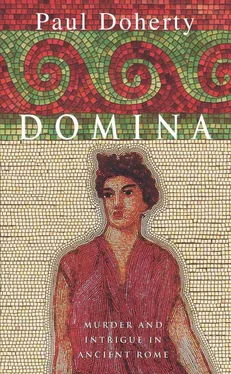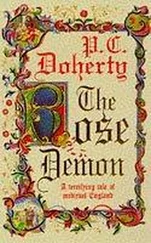Paul Doherty - Domina
Здесь есть возможность читать онлайн «Paul Doherty - Domina» весь текст электронной книги совершенно бесплатно (целиком полную версию без сокращений). В некоторых случаях можно слушать аудио, скачать через торрент в формате fb2 и присутствует краткое содержание. Год выпуска: 2012, ISBN: 2012, Издательство: Headline, Жанр: Исторический детектив, на английском языке. Описание произведения, (предисловие) а так же отзывы посетителей доступны на портале библиотеки ЛибКат.
- Название:Domina
- Автор:
- Издательство:Headline
- Жанр:
- Год:2012
- ISBN:9780755350490
- Рейтинг книги:3 / 5. Голосов: 1
-
Избранное:Добавить в избранное
- Отзывы:
-
Ваша оценка:
- 60
- 1
- 2
- 3
- 4
- 5
Domina: краткое содержание, описание и аннотация
Предлагаем к чтению аннотацию, описание, краткое содержание или предисловие (зависит от того, что написал сам автор книги «Domina»). Если вы не нашли необходимую информацию о книге — напишите в комментариях, мы постараемся отыскать её.
Domina — читать онлайн бесплатно полную книгу (весь текст) целиком
Ниже представлен текст книги, разбитый по страницам. Система сохранения места последней прочитанной страницы, позволяет с удобством читать онлайн бесплатно книгу «Domina», без необходимости каждый раз заново искать на чём Вы остановились. Поставьте закладку, и сможете в любой момент перейти на страницу, на которой закончили чтение.
Интервал:
Закладка:
The glade was circular, as if man-made, fringed by the dark cypress trees, totally deserted except for a few rocks piled in the middle. Agrippina paused at these. I do not have a fanciful imagination but the longer I stood there, the heavier weighed the silence: oppressive, no sound at all, no night bird, no rustling in the grass, not even the slightest breeze stirred those trees. It was as if we were studying a mural or a painting. Agrippina was pale-faced, her hand shaking so much I had to take the torch. I followed her gaze. A mist, or what looked like a mist, snaked out from the trees, creeping across the grass. When it reached the rocks it began to rise. I experienced a nameless terror, a panic as if someone was quietly menacing me with unseen horrors. Agrippina began to speak. She was invoking protection against the powers of darkness. I pressed her shoulder, and found it ice-cold. A sound came from the mist, like a rustling on the breeze, before a harsh guttural voice spoke.
May the Gods be my witness: my heart chilled, my bowels and my stomach curdled with fear. Caligula! The dead Emperor’s ghost had risen from his grave. He was standing behind me whispering in my ear, those same awful sounds he had made when talking to himself. The glade assumed a horror all of its own. A shadow seemed to race across yet there was little light from the moon, and our torches spluttered weakly. A place of hideous terror.
‘This is Caligula’s grave, isn’t it?’ I asked.
‘It is,’ Agrippina answered. ‘The stories are all over Rome, of how this place is haunted by demons.’ She glanced at me, eyes beseeching. ‘He comes to me, Parmenon, in the dark watches of the night. I see his blood-spattered face and he begs me for burial.’ She paused. ‘I have tried to arrange it but no one will help me.’
I summoned my courage and did what she asked. Hoes and mattocks lay about, dropped by slaves who’d attempted the task only to flee. I removed the rocks and dug at the soft soil beneath. I soon disinterred the corpse, which was wrapped in soiled, dirty sheets. Partly cremated, the fire had at least cleansed and purified the remains. The face was indistinct, obliterated by dark scorch marks, although it was easy to recognise the shape of the head and that monstrous tuft of hair on the nape of the neck which had not been touched. Agrippina’s bodyguard recovered their courage and, urged on, they collected dry kindling. I hardly looked at what I carried but laid it on the ground and helped the others build the makeshift funeral pyre, before placing the corpse on top. Agrippina murmured a few prayers and coated both cadaver and wood with the contents of an amphora of oil. A torch was brought and then all that remained of Caligula, friend of the Gods, was consumed by fire.
Agrippina never mentioned her brother’s funeral again. She returned to our house and continued the role of the noble recluse. She settled down to the life of a peace-loving matron, totally devoted to her son, ever ready to entertain the Emperor with lectures, masques and declamations, most of them connected with Rome’s history. She and Messalina watched each other like sparring leopards. If the Emperor couldn’t come, Agrippina entertained his freedmen, Narcissus and Pallas, powerful officials in charge of the treasury, the courts and access to the Emperor.
I accompanied her everywhere. Agrippina never referred to the Emperor, the court or contemporary politics, even when Claudius began the usual purge of the Senate and settled grudges with those who had insulted and belittled him over the years.
In the February following his accession, Messalina gave birth to a puny boy who was promptly named Britannicus. Agrippina played the kind kinswoman, sending gifts to both parents as well as to the child. She hid her rage and resentment well. She stalked Messalina like a feral cat would its prey, but never once did she show her claws. Instead, she fought her battles through her sister Julia who, with her beauty and wild, wanton ways, had soon become the toast of elegant Roman society.
Agrippina quietly urged Julia on. She introduced her sister to the one man whose mind Agrippina admired: our noble Spanish philosopher and financier, Annaeus Seneca. I never really found out why Agrippina admired that man so much.
‘It might have been he who betrayed us to Caligula, remember?’ I warned.
Agrippina shook her head. ‘That traitor’s still alive!’
‘What? Afer the orator?’
‘That traitor is still alive!’ she repeated, eyes widening.
She was, of course, referring to old Claudius.
She pressed a finger against my lips. ‘In time, Parmenon, in time all debts are settled!’
I was still concerned about Seneca. He’d returned from exile, more cunning and vindictive than ever. He was also an arrant hypocrite. He wrote treatises on youth and on old age and composed eloquent reflections on man’s destiny. He preached poverty and austerity, and yet he relished the comforts of high society. He claimed to despise wealth but was as shrewd an investor as any banker.
Agrippina discussed philosophical matters with him, sharpening her mind, preparing herself for further debates with Claudius. She also made no attempt to disguise her ambition for Seneca to become her beloved Nero’s tutor. Agrippina played a clever, subtle game, or thought she did. She wined and dined Seneca, laughed at his witticisms, flattered his overweening ego but refused any dalliance. Instead, Julia her sister was discreetly put forward as the philosopher’s possible mistress. They became regular visitors to the court, the favoured guests who had to be invited to any important banquet or supper party.
‘I know what you are doing,’ I challenged Agrippina one evening after the couple had left.
‘Do you, Parmenon?’ she replied. ‘I love my sister.’
‘No, you don’t. You love only one person, Domina — your son.’
She refused to hold my gaze but walked back to a side table and poured a goblet of wine.
‘Have you heard the rumours?’ I asked.
‘Oh, don’t tell me that Messalina’s pregnant again!’
‘No, Domina, Messalina is watching you.’
‘And?’
‘Be careful, you can provoke her too far!’
Agrippina refused to heed the warning. She continued to entertain and flatter Claudius as well as encourage her sister to become the leading light of Roman society. Messalina decided enough was enough and struck. One night I was awoken by the sound of crashing and screaming and the clash of swords. I left my bedchamber, a sheet wrapped round me, and fled down the passageways and galleries. The rest of the household had already been disturbed. The sounds were coming from the far end of the house where Agrippina and her son had their bedchamber. Both were safe but Castor and Pollux paid for their brave defence of their mistress and her son with their lives. Castor was already dead, with a terrible gaping wound to his neck. Pollux, who had fought on single-handedly against the intruders, was a mess of blood and gore from head to toe. Before the intruders had fled, he had taken a thrust to the stomach. When I reached them, Agrippina was already bending over him, listening to his harsh, guttural whispers. Agrippina got to her feet, whispered to a servant who stepped forward and quickly cut the German’s throat. I had both corpses removed and sent out armed retainers to search for the intruders. They followed the trail of blood to the wall but returned empty-handed.
Agrippina was beside herself with fury. She moved her frightened son to another heavily guarded chamber and met me in her writing office. She reminded me of a raging lioness, pacing up and down, furious at the attack on her son. Only gradually did I get the details from her. She and Nero retired late, and as usual Castor and Pollux stood guard over both chambers. She had suspected nothing until woken by cries and the clash of swords. The Germans had apparently drawn the bolts on the outside of each door, a shrewd move as it prevented Agrippina or her son panicking — if they’d tried to flee their chambers, they would have run straight on to the swords of the assassins. Both Germans had fought bravely until the rest of the house had been aroused and the attackers fled, dragging their dead and wounded comrades with them.
Читать дальшеИнтервал:
Закладка:
Похожие книги на «Domina»
Представляем Вашему вниманию похожие книги на «Domina» списком для выбора. Мы отобрали схожую по названию и смыслу литературу в надежде предоставить читателям больше вариантов отыскать новые, интересные, ещё непрочитанные произведения.
Обсуждение, отзывы о книге «Domina» и просто собственные мнения читателей. Оставьте ваши комментарии, напишите, что Вы думаете о произведении, его смысле или главных героях. Укажите что конкретно понравилось, а что нет, и почему Вы так считаете.












